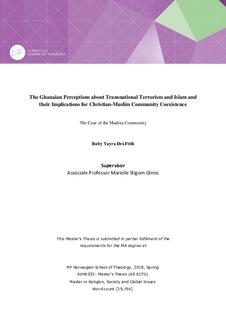The Ghanaian Perceptions about Transnational Terrorism and Islam and their Implications for Christian-Muslim Community Coexistence: The Case of the Madina Community
Master thesis
Permanent lenke
http://hdl.handle.net/11250/2502311Utgivelsesdato
2018Metadata
Vis full innførselSamlinger
Sammendrag
ABSTRACT
West Africa which used to be a quieter zone regarding terrorism is presently plagued with the activities of terrorist groups linked with Islam. Terrorism linked with Islam is creating challenges of Islamophobia (fear and hatred for Islam and Muslims) in multi-religious societies in the post 9/11 era. Islamophobia is based on the perception which links Muslims to terrorism. Ghana is a multi-religious society. Thus, the present study sought to find out the Ghanaian perceptions about transnational terrorism and Islam/Muslims. Furthermore, the study also sought to find out the implications of such Ghanaian perceptions on Christian-Muslim coexistence.
This was a qualitative study, with data collected through face-to-face interviews. The respondents were Christians and Muslims selected from Madina, Accra. Intergroup theories such social identity, social perception, stereotyping, and the contact theory served as the theoretical framework for the study. This framework was further enhanced by discussions on Islamophobia.
The study found out that Christians and Muslims coexist relatively peacefully in Madina. Yet, Christians perceive Muslims as violent and potential terrorists and thus a suspect community when it comes to terrorism. The study further revealed that such negative perceptions about Muslims could lead to their social exclusion and the marginalization. This, the study found, could result in counter reactions from Muslims, with negative implications for peaceful community coexistence.
The significance of this study has been its contributions to the ongoing discussions about Islamophobia. The study has drawn attention to the fact that Islamophobia is not only a Western issue, but also an African issue. Furthermore, the study revealed that the challenges of Islamophobia may not only be seen in policies, but they may also be challenges at the community coexistence level.
